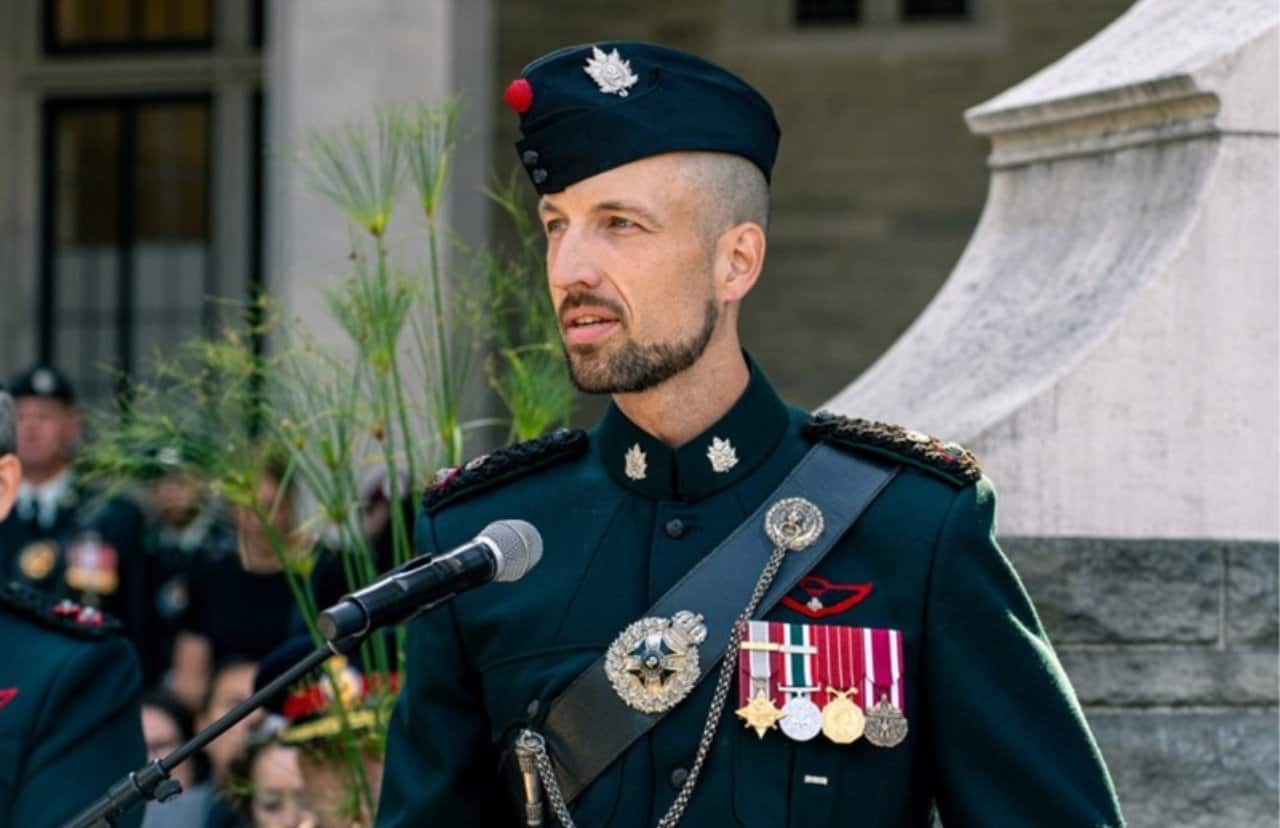Pickering cop made commander of historic reserve military regiment, The Queen’s Own Rifles
Published October 2, 2023 at 12:42 pm

A Durham Regional Police officer is now in command of a historic military reserve regiment, the The Queen’s Own Rifles of Canada (QOR).
On Sept. 17, the QOR held a Change of Command and Appointment Ceremony at Casa Loma to appoint Lieutenant-Colonel Chris Boileau, CD and Chief Warrant Officer Justin Thorn as the regiment’s new command team.
According to his LinkedIn, Boileau has served the Canadian Armed Forces for nearly 20 years. He served in Iraq as part of Operation: Inherent Resolve, a nine-year campaign against the Islamic State terrorist group. More recently he was part of Operation: Unifer in Poland which has been training and supporting the Ukrainian Armed Forces as they fight Russian invaders since 2015.
Boileau has also been a member of Durham Police’s West Division, which patrols Pickering, for 15 years. He now serves as a Staff Sergeant and Platoon Leader. On his appointment, Boileau said, “It is an honour and privilege to be appointed to command and entrusted with the leadership of Canada’s men and women.”
The QOR has been one of Canada’s most notable reserve units since before Confederation. The regiment was founded in 1860, five years before Canadian independence.
They were deployed to Fort Erie in 1866 to fend off Fenian Raids from the United States. They took part in the largest battle in the conflict, the Battle of Ridgeway, Canada’s first post-industrial military engagement. It was the first time Canadian-only troops were commanded solely by Canadian officers.
However, the better-equipped and experienced Fenians, an Irish-American group working to pressure the United Kingdom out of Ireland, routed the inexperienced Canadians and briefly took the town of Ridgeway.
The regiment was next deployed to combat Louis Riel’s North-West Rebellion in 1885. The violent five-month insurgency pit Riel’s largely Metis forces against the much larger Canadian militias. The Canadian forces crushed the rebellion in the bloody Battle of Batoche.
Next, the QOR were deployed to South Africa in 1900 for the Second Boer War between the British Empire and former Dutch colonies. This was their first deployment on foreign soil. They earned a battle honour for the regiment from Queen Victoria.
The regiment saw extensive fighting in the First World War between 1914 and 1918, including some of the most notable Canadian engagements in the Somme, Vimy Ridge, and Passchendaele.
In the Second World War, the QOR were initially stationed in Newfoundland, which was not yet a part of Canada. They were sent to Gander and Botwood in 1940 to guard strategically important airfields. They were deployed to Britain in 1941, but soon returned to defend the home front.
However, they were again sent to Europe in 1944 to take part in the D-Day landings in Normandy, France. The QOR landed on Juno Beach and captured the seaside town of Bernières-sur-Mer. From there, they advanced to their landing goal of Anisy, a small village 13 kilometres in land. They were the only regiment to reach their goal that day.
The victory was hard won, however. The Queen’s Own Rifles had the most casualties in the D-Day landing of any Canadian regiment with 143 killed, injured or captured.
The regiment continued in land through France and into Belgium and the Netherlands. They contributed to the recapture of airfields, and vital channel routes. Throughout this campaign, the regiment lost 463 riflemen and another 900 were injured. Another 60 were killed in Hong Kong, Italy and northwest Europe.
Following the Second World War, The Queen’s Own Rifles served in the Korean War and peacekeeping operations in Afghanistan, Bosnia, Cambodia, Cyprus, Darfur, Kosovo, Namibia, Sierra Leone, Somalia, and Sudan.
The regiment has seen many notable servicemen and women in that time including;
- Vincent Massey, later Governor-General from 1952-1956
- John Morison Gibson, Lieutenant Governor of Ontario from 1908-1914
- Hugh John McDonald, John A. McDonald’s son and Premier of Alberta in 1900
- Major-General Lewis McKenzie, who oversaw United Nations operations in Sarajevo, Yugoslavia
- Major-General Malcom Mercer, who was slain in Belgium in the First World War and is the highest ranking Canadian service man to die in combat






